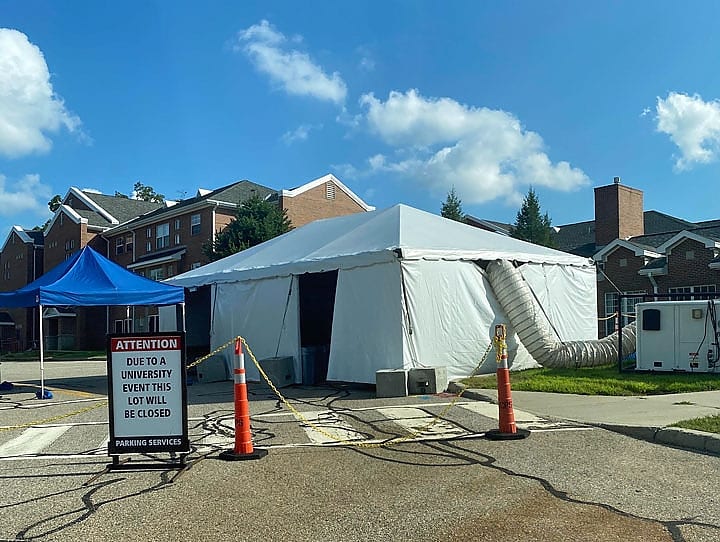Colleges Reopen with Consent Forms, Masks and Hybrid Classes

Audio By Carbonatix

COVID testing site at the University of Connecticut. Erica Franklin photo, courtesy of CTNewsJunkie.com
West Hartford-based University of Hartford is relying on community responsibility as part of its strategy of preventing an outbreak of COVID-19.
By Kristina Vahkman, CTNewsJunkie.com
When the University of Connecticut announced it would be reopening for the fall semester, junior Erica Franklin thought the decision wouldn’t be permanent. But like many other institutions across the state, UConn is resuming campus operations after a sudden shutdown in the spring, and COVID fears aside, Franklin is glad to be back.
“I’m going into one of my harder years at school and I think the mental support of friends and classmates is something I need,” Franklin said.
Franklin returned to on-campus housing as did thousands of students across Connecticut’s colleges this weekend – masked and socially distanced. On arrival, she and other UConn students were tested for COVID-19. They are expected to self-quarantine for 14 days before the start of the semester, according to the university’s reopening plan.
Franklin and her roommate both tested negative, but school officials said that two other students tested positive Sunday morning and have been put into isolation on the Storrs campus.
“As long as UConn takes the right precautions with quarantining these students and the ones they came in contact with, they should be able to keep it under control,” Franklin said. “It’s going into the public spaces and lecture halls [for in-person classes] I’ll be nervous about.”
Like other Connecticut institutions, UConn was required to submit its reopening plan to state officials. The plan includes the university’s hybrid model of classes with some in-person, some online and some both, as well as strict guidelines to always wear masks and to social distance in public.
At Trinity College in Hartford, the reopening plan is more stringent. All on-campus housing is now one-student-per-bedroom to reduce capacity, and students and employees will be tested regularly throughout the fall semester. The college will pay for this testing plan and for pre-arrival tests to those who cannot afford them.
Vice President for Student Success and Enrollment Management Joe DiChristina called Trinity’s testing routine “robust.”
“They will be PCR COVID-19-tested twice a week. That’s a foundational piece of this return – how we’re monitoring COVID-19 on campus, responding to cases of it and making sure that our students are healthy,” DiChristina said.
For junior Hassan Rashid, Trinity’s reopening plan is beyond adequate. An international student currently at home in Pakistan, Rashid was more worried that the upcoming semester would be remote. He misses his friends, his routine and the campus, and all-online classes would be difficult with the 9-hour time difference and internet connection issues. When Rashid returns, he’ll be taking two in-person classes.
“I just think for me there is more mobility with being and studying on campus than being back home,” he said. “I think a lot of this contributes to good mental and physical health and at the start of the pandemic, most people didn’t really think how important the mental [and] physical health aspect of all of this is.”
Trinity students must sign a “COVID-19 Trinity Community Contract” and pledge to adhere to the college’s safety measures, like cleaning and disinfecting regularly-used surfaces, as well as wearing a cloth face cover when around others.
The contract states that “even with all the protections implemented by Trinity College and my compliance with those protections, it is possible that I may be exposed to and contract COVID-19,” which can result in “severe illness or even death.”
The University of Hartford is also depending on community responsibility. All UHart students, employees and visitors must complete a COVID-19 screening survey on the university’s LiveSafe app before arriving on campus and going to class.
UHart senior Isaac Kueber thinks that the survey is good in theory, but only if the responses are honest. Kueber said he’s nervous about in-person classes, especially because he’s heard rumors of students planning discreet parties that break the university’s social distancing guidelines.
“I think that group of people has the potential to mess it all up. All it’s gonna take is one outbreak,” Kueber said. “But everyone’s pretty much agreed to report [those parties] as they happen.”
According to UHart’s Student Conduct Guidelines, “hosting or attending a gathering or party, including a ‘COVID party’” can result in loss of residential housing and interim suspension.
Moreover, each week, UHart will select between five and 10 percent of residential students for mandatory asymptomatic COVID-19 testing at no charge. Commuters won’t be tested.
The same goes for Central Connecticut State University in New Britain, where between five and 10 percent of the resident-student population and residence hall directors will be tested weekly, according to the university’s reopening plan. All out-of-state resident-students and out-of-state commuters will be included in the first week of random testing as well, but local commuters will not be tested.
And like UConn, Trinity and UHart, CCSU will require masks with reduced residential and classroom capacity to enforce social distancing.
However, CCSU and the other Connecticut State Colleges and Universities institutions will be implementing a “HyFlex” model of courses, where half of a class is present in the classroom, while the other half is watching the lecture simultaneously on a live-stream from home.
The strict protocol and new modality turned senior Jenna Hugh away from returning to on-campus housing and in-person classes. She is taking all of her courses remotely.
“I decided that the added stress from the pandemic and the increase in tuition wasn’t worth the extra money to live on campus. I miss CCSU, but I want the world to be safe more,” Hugh said.
Marissa Vazquez, another CCSU senior, said she also couldn’t imagine going back to campus, as she has asthma and family members with compromised immune systems.
“I think it’ll be hard to contain if somebody who stays on campus gets it,” Vazquez said.
Vazquez also thinks that CCSU is rushing into a reopening and should hold off with in-person classes until 2021.
“I feel like a lot of classes could just be taught online until there’s more information about when there will be an end to the pandemic,” she said.
Republished with permission from CTNewsJunkie.com, all rights reserved.
Like what you see here? Click here to subscribe to We-Ha’s newsletter so you’ll always be in the know about what’s happening in West Hartford! Click the blue button below to become a supporter of We-Ha.com and our efforts to continue producing quality journalism.



